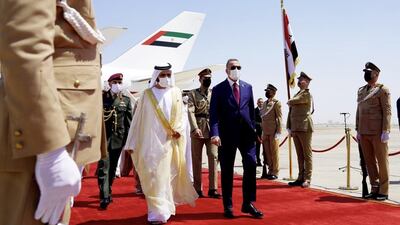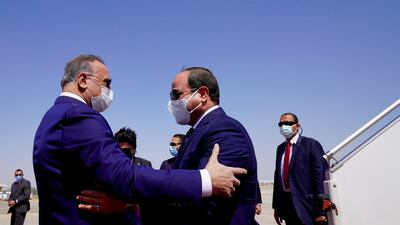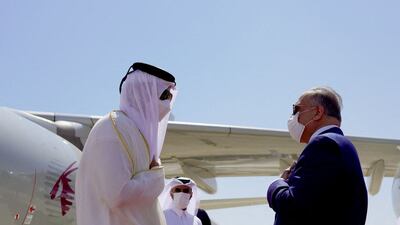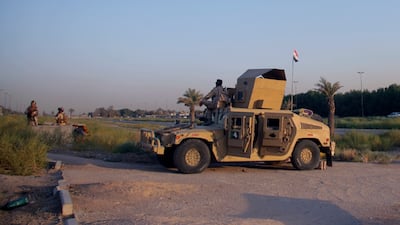Leaders and senior officials of nine countries will meet in Baghdad on Saturday for a summit that Iraqis hope will secure support for their war-torn country and mitigate tensions in the region.
The invited Arab countries are the UAE, Jordan, Egypt, Kuwait, Saudi Arabia and Qatar. Officials from Iran, Turkey and France will also be present.
Representatives of the permanent members of the UN Security Council, the European Union, members of the G20 group, the Gulf Co-operation Council and the Arab League will attend as observers.
Baghdad Conference for Co-operation and Partnership will help in “easing tensions and crises in the region as well as supporting the constructive path of positive dialogue and negotiations”, Iraqi President Barham Salih said.
Mr Salih on Thursday told a delegation of Arab journalists that one of the reasons for the woes in the region was the absence of a stable and capable Iraq.
“The problems in the region can’t be solved without supporting Iraq, its sovereignty, independence and development,” he said. “The future of Iraq is important for the future of the countries in the region."
Saddam Hussein’s 1990 invasion of Kuwait isolated Iraq for more than a decade as countries severed ties with his regime.
Even after the toppling of Saddam’s Sunni-led regime in 2003 by a US-led invasion, many Arab states were hesitant to restore relations, considering successive Shiite-led governments too close to Iran.
However, since late 2007, many Arab countries began to normalise relations with Iraq at the urging of Washington in an attempt to counter growing Iranian influence.
Saturday’s summit is the latest effort by Baghdad to boost relations with Arab countries.
Baghdad has been holding meetings with Jordan and Egypt to build co-operation, mainly in the energy sector, and has hosted several meetings between rivals Saudi Arabia and Iran in a bid to boost its position as a regional mediator and reduce tensions in Iraq and beyond.
Although Baghdad had hoped for leaders of all invited states to attend, as of Friday only Egyptian President Abdel Fattah El Sisi, Jordan's King Abdullah II and French President Emmanuel Macron had confirmed their participation.
Mr Macron arrived in Baghdad shortly after midnight and was received by Prime Minister Mustafa Al Kadhimi.
“Today’s conference is a historic one,” Mr Macron said in a joint press conference with Mr Al Kadhimi on Saturday.
“Stability in Iraq is not possible unless there is a willingness in the region to co-operate,” he said, and bringing together all parties is the “main condition for this stability”.
“The region and its people have suffered a lot of wounds from numerous conflicts and grave challenges," he said.
“I believe that the sense of responsibility we have and our ability to go forward are bringing us today around one table to build projects of co-operation.”
Kuwait will be represented by its Prime Minister, Sheikh Sabah Al Sabah and Iran by its Foreign Minister Hossein Amir-Abdollahian. Saudi Arabia, the UAE, Qatar and Turkey have yet to confirm.
Excluding Syria from the meeting upon request from some countries, mainly France, different levels of representation and lack of clear agenda suggest differences among the participating countries in regard to regional issues.
Iraqi officials say the meeting is expected to discuss the war in Yemen, Lebanon’s economic collapse and the region’s water crisis without elaborating. No agreement has been reached on discussing the crisis in Syria.
They also hope the meeting could work towards a rapprochement between Saudi Arabia and Iran.
“Today we say: we’ve had enough conflicts, we’ve had enough wasting our lives and money for others' conflicts,” Mr Salih said.
“And to the region and mainly to our neighbours we say: instead of making Iraq a battleground for conflicts, it can be a crossing, a bridge and a point of contact where all can meet,” he added.
Some Iraqis feel the government needs to focus on domestic problems rather than regional issues.
“Only with a stable domestic political scene can Iraq begin to address foreign policy issues,” security analyst Abdul-Ameer Jawad wrote in 1001 Iraqi Thoughts, a platform for analysis and commentary.
“The selection of Arab countries in attendance speaks to Al Kadhimi’s aspirations and his efforts to portray Iraq under his term as a stable regional player, having more in common with states like Egypt and the Gulf than Lebanon, Syria and Libya,” he said.
He describes the conference as a “political theatre” ahead of October 10 elections “meant to showcase Kadhimi’s foreign policy credentials as he attempts to secure a second term”.














